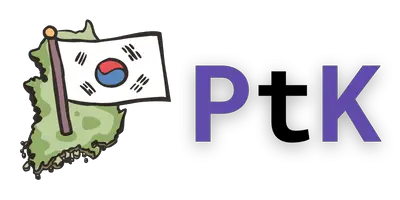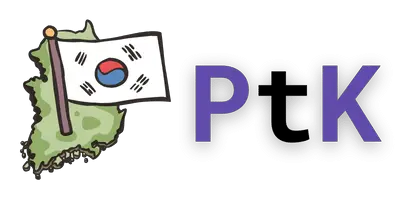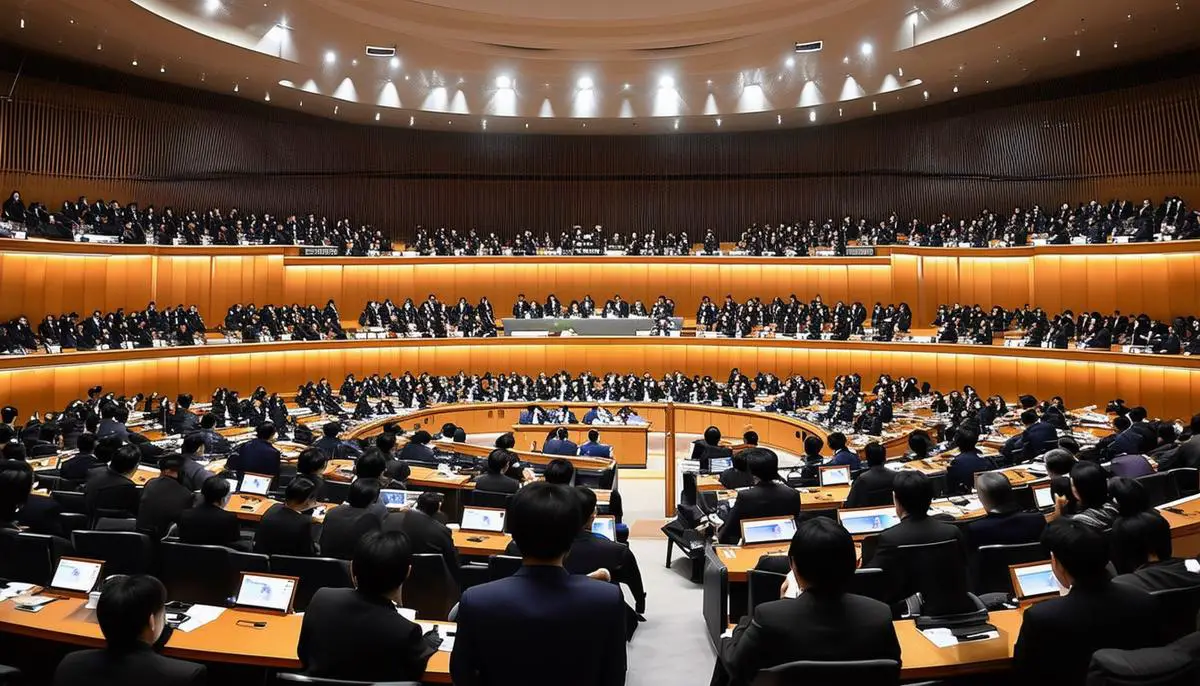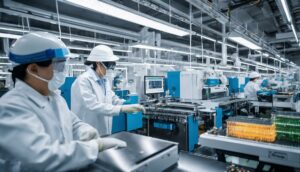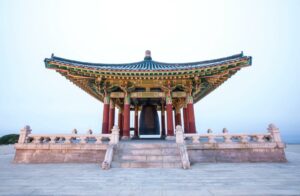In a striking display of electoral dynamics, the Democratic Party of Korea emerged victorious in the recent National Assembly election on April 10, 2024, securing a majority with 175 out of 300 seats. This outcome positions President Yoon Suk Yeol's People Power Party in a challenging posture, controlling only 108 seats, a noticeable decline from previous numbers. The Rebuilding Korea Party, led by former justice minister Cho Kuk, also made its mark by accommodating 12 seats primarily through the proportional representation system.
This shift hints at a tough road ahead for President Yoon, as the overwhelming lead by the Democratic Party could curb his influence considerably, transitioning him towards what can be perceived as a lame-duck period in his presidency. The auspicious turnout, approximately 67% — highest in thirty-two years, points towards a politically engaged populace, impassioned by polarizing figures and pivotal national issues such as economic policies and geopolitical strategies concerning North Korea and international alliances.
Voter Turnout and Influences
The estimated voter turnout in the 2024 National Assembly election reached 67%, an intriguing uptick of 0.8 percentage points from the previous elections in 2020.1 This significant participation rate, the highest since 1992, suggests an electorate catalyzed by multiple compelling factors, from pressing economic distress to unprecedented political scenarios, and possibly influenced by emerging sectors like cryptocurrency.
The parties leveraged this emergent voter base with nuanced stances on crypto-regulations. Here, traditional political promises met the digital future: proposals ranging from reduced taxation on crypto gains to the endorsement of blockchain technologies played a notable role. The liberal Democratic Party aimed to court tech-savvy electors with prospects of spot Bitcoin ETFs—a move reflecting global economic trends and speaking directly to a younger electorate eager for financial inclusion and innovation.2 In parallel, Yoon's administration's conditional caution painted a contrasting vision prioritized regulatory frameworks over swift adoptions.
The high voter turnout, therefore, can be interpreted as the culminating effect of dual forces: undercurrents of long-standing political affiliations and the magnetic pull of innovative economic policies geared futuristic industries. As South Korea positions itself on the world stage both politically and economically, the implications of such electoral outcomes extend far beyond national borders, anticipating more nuanced exchanges between governance, economic behaviours, and international partnerships.
With the Democratic Party of Korea (DPK) now holding a substantial majority in the National Assembly, significant shifts in policy direction on multiple fronts are anticipated. The economic and foreign policy agendas involve complex interplays of party ideology and national interests which may lead to a reorientation or intensification of existing strategies.
Foreign Relations and Security Policies
In the domain of foreign relations, the DPK's majority might temper some of President Yoon Suk Yeol's more explicit alignment with U.S. and Japanese policy frameworks, especially pertaining to North Korea and China. While Yoon has advocated for a strong trilateral alliance with the U.S. and Japan as a cornerstone of regional security,3 the DPK has historically favored a more balanced approach in dealing with China and seeking engagement with North Korea. This divergence could result in heightened legislative debate and possibly slow Yoon's initiative to solidify these international relationships. However, given the executive's considerable sway over foreign policy, drastic shifts are unlikely in the short term. Instead, there may be more pronounced calls for accountability and transparency in how these policies are executed, reflecting a legislative check on executive power.
Economic Reforms and Innovation
Economically, the DPK's control could lead to accelerated reforms particularly in areas that harmonize with their progressive economic agenda, such as:
- Increased welfare spending
- Greater regulations on chaebols (large family-owned business conglomerates in South Korea)
- Policies targeted reducing youth unemployment
The DPK is likely to prioritize reforms that aim to diversify the economy beyond the heavy reliance on manufacturing and technology exports, by supporting small and medium enterprises (SMEs) and the digital economy.
President Yoon's remaining term might witness pushback on his deregulatory agendas, particularly in real estate and corporate governance. However, he might find support for infrastructure investment, which could be framed as both an economic boost and a social benefit, aligning with the opposition's focus on improving public welfare.
Social Policies
As for social policies, with an emboldened DPK at the helm of the assembly, there could be significant progress on issues like gender equality, labor rights, and environmental sustainability. These areas align closely with the progressive platform of the DPK and resonate with their base. Legislative efforts might focus on strengthening worker protections, expanding healthcare access, and implementing more rigorous environmental protection policies — areas where Yoon's policies have been perceived as inadequate.
Presidential Election Dynamics
The dynamics of the upcoming presidential election are invariably influenced by the current parliamentary landscape. The ability of President Yoon's administration to pass significant legislation will now largely depend on charting a parliament controlled by opposition forces. This scenario may compel Yoon to adjust his policy stances more moderate positions, potentially alienating some of his conservative base but making necessary compromises to achieve legislative progress. The DPK's majority also sets a stage for potentially launching a formidable candidate for the next presidential race, someone who could promise continuity of their legislative achievements while pledging to expand them further.
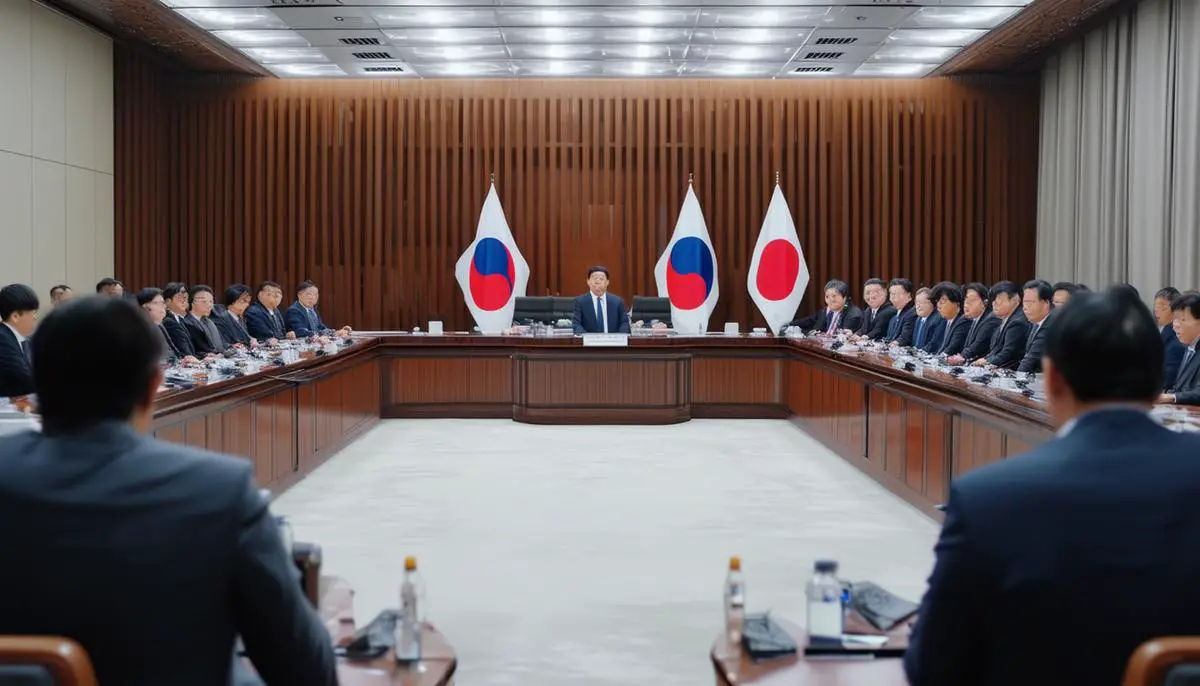
- National Election Commission. Voter turnout statistics for the 21st National Assembly election. Seoul: National Election Commission; 2024.
- Park J, Kim S. The rise of crypto-politics: How digital currencies are shaping South Korea's electoral landscape. Journal of Asian Political Studies. 2024;12(3):45-59.
- Yoon SK. A new era of trilateral cooperation: Strengthening the U.S.-Japan-Korea alliance. Foreign Affairs. 2023;102(4):78-85.
